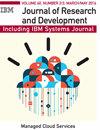Knowledge on Childhood Dental Caries Among Parents of Under Five Children in A Community at Biratnagar, Nepal
IF 1.3
4区 计算机科学
Q1 Computer Science
引用次数: 0
Abstract
Dental caries is a major public health problem globally and is one of the most chronic diseases in children. Children are susceptible to caries as soon as the first teeth appear. Parents are the primary decision-makers in matters of children's healthcare. If the parents are knowledgeable about the child's oral health care then childhood dental caries can be prevented. The objective of this study was to identify the knowledge on childhood dental caries among parents of under five children. A descriptive, cross-sectional study was carried out among parents of under five children in a community of Biratnagar 12. Sample was selected using non probability purposive sampling method and data was collected by face-to-face interview using a self-developed, semi-structured interview guideline. Descriptive statistics i.e. frequency, percentage, mean and standard deviation was used to assess the level of knowledge and inferential statistics i.e chi square was used to find the association between dependent and independent variables. About three fourths (71%) of the parents were of age group 20-30 years and 88% of them were mothers. Most of the parents (90%) were aware that dental caries can occur in under five children and excessive sugar intake was the most common cause as reported by all of them. Only 40% knew that dental caries is transmissible and among them 97.6% responded by sharing of toothbrush. Regarding good brushing habit, most of the parents were aware. Almost all (95%) knew that proper tooth brushing helps to prevent dental caries whereas only 19% were aware about use of fluoridated tooth paste as preventive measures. Meanwhile, only 12% of the parents were aware that first dental visit should be done when first tooth erupts or within 1 year of age More than half (79%) had good knowledge on childhood dental caries but there was no association of knowledge with socio-demographic variables. The study concluded that more than half of the respondents had good knowledge on childhood dental caries and none of the socio-demographic variables were associated with the level of knowledge of parents on dental caries. Despite good knowledge, prevalence of childhood dental caries is high in our society thus reflecting the need to assess the practice of dental care.尼泊尔比拉特纳加尔社区五岁以下儿童父母对儿童龋齿的了解
龋齿是全球主要的公共卫生问题,也是儿童中最严重的慢性疾病之一。孩子一长出第一颗牙就容易患龋齿。父母是儿童保健问题的主要决策者。如果父母了解孩子的口腔保健,那么儿童龋齿是可以预防的。本研究的目的是确定五岁以下儿童的父母对儿童龋齿的认识。在Biratnagar 12社区的五岁以下儿童的父母中进行了一项描述性横断面研究。样本选取采用非概率目的抽样法,数据采集采用自行制定的半结构化访谈指南进行面对面访谈。描述性统计(即频率、百分比、平均值和标准差)用于评估知识水平,推断性统计(即卡方统计)用于发现因变量和自变量之间的关联。大约四分之三(71%)的父母年龄在20-30岁之间,其中88%是母亲。大多数家长(90%)都知道五岁以下儿童也可能患龋齿,而所有家长都表示,摄入过多糖分是最常见的原因。只有40%的人知道龋齿具有传染性,其中97.6%的人通过共用牙刷来回答。关于良好的刷牙习惯,大多数家长都知道。几乎所有(95%)的人都知道正确刷牙有助于预防龋齿,而只有19%的人知道使用含氟牙膏作为预防措施。与此同时,只有12%的家长知道应该在第一颗牙长出来时或1岁以内进行首次牙科检查。超过一半(79%)的家长对儿童龋齿有很好的了解,但与社会人口统计学变量的知识没有关联。该研究的结论是,超过一半的受访者对儿童龋齿有很好的了解,没有一个社会人口变量与父母对龋齿的知识水平相关。尽管有良好的知识,儿童龋齿的患病率是高在我们的社会,因此反映了需要评估牙科保健的做法。
本文章由计算机程序翻译,如有差异,请以英文原文为准。
求助全文
约1分钟内获得全文
求助全文
来源期刊

IBM Journal of Research and Development
工程技术-计算机:硬件
自引率
0.00%
发文量
0
审稿时长
6-12 weeks
期刊介绍:
The IBM Journal of Research and Development is a peer-reviewed technical journal, published bimonthly, which features the work of authors in the science, technology and engineering of information systems. Papers are written for the worldwide scientific research and development community and knowledgeable professionals.
Submitted papers are welcome from the IBM technical community and from non-IBM authors on topics relevant to the scientific and technical content of the Journal.
 求助内容:
求助内容: 应助结果提醒方式:
应助结果提醒方式:


